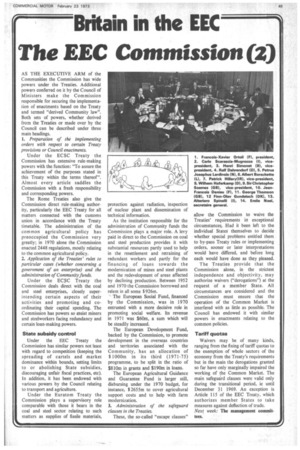Britain in the EEC
Page 49

If you've noticed an error in this article please click here to report it so we can fix it.
The EEC Commission (2)
AS THE EXECUTIVE ARM of the Communities the Commission has wide powers under the Treaties. Additional powers conferred on it by the Council of Ministers make the Commission responsible for securing the implementation of enactments based on the Treaty and termed "derived Community law". Both sets of powers, whether derived from the Treaties or made over by the Council can be described under three main headings.
1. Preparation of the implementing orders with respect to certain Treaty provisions or Council enactments.
Under the ECSC Treaty the Commission has extensive rule-making powers with the function; "To assure the achievement of the purposes stated in this Treaty within the terms thereof". Almost every article saddles the Commission with a fresh responsibility and corresponding powers.
The Rome Treaties also give the Commission direct rule-making authority, particularly the EEC Treaty for all matters connected with the customs union in accordance with the Treaty timetable. The administration of the common agricultural policy has preoccupied the Commission very greatly; in 1970 alone the Commission enacted 2448 regulations, mostlY relating to the common agricultural policy.
2. Application of the Treaties' rules to particular cases (whether concerning a government of an enterprise) and the administration of Community funds.
Under the ECK Treaty the Commission deals direct with the coal and steel enterprises, closely superintending certain aspects of their activities and promoting and coordinating their capital spending. The Commission has powers so assist miners and steelworkers facing redundancy and certain loan-making powers.
State subsidy control Under the EEC Treaty the Commission has similar powers not least with regard to competition (keeping the spreading of cartels and market dominance within bounds, setting limits to or abolishing State subsidies, discouraging unfair fiscal practices, etc). In addition, it has been endowed with various powers by the Council relating to transport and agriculture.
Under the Euratom Treaty the Commission plays a supervisory role comparable with those it bears in the coal and steel sector relating to such matters as supplies of fissile materials,
protection against radiation, inspection of nuclear plant and dissemination of technical information.
As the institution responsible for the administration of Community funds the Commission plays a major role. A levy paid in direct to the Commission on coal and steel production provides it with substantial resources partly used to help in the resettlement and retraining of redundant workers and partly for the financing of loans towards the modernization of mines and steel plants and the redevelopment of areas affected by declining production. Between 1952 and 1970 the Commission borrowed and relent in all some $ 926m.
The European Social Fund, financed by the Commission, was in 1970 entrusted with a more decisive role in promoting social welfare. Its revenue in 1971 was $60m, a sum which will be steadily increased.
The European Development Fund, backed by the Commission, to promote development in the overseas countries and territories associated with the Community, has an allocation of $ 1000m in its third (1971-75) programme, to be split in the ratio of $810m in grants and $190m in loans.
The European Agricultural Guidance and Guarantee Fund is larger still, disbursing under the 1970 budget, for instance, S 2655m to cover agricultural support costs and to help with farm modernization.
3. Administration of the safeguard clauses in the Treaties. These, the so-called "escape clauses" allow the Commission to waive the Treaties' requirements in exceptional circumstances. Had it been left to the individual States themselves to decide whether special problems entitled them to by-pass Treaty rules or implementing orders, sooner or later interpretations would have differed, and before long each would have done as they pleased.
The Treaties provide that the Commission alone, in the strictest independence and objectivity, may authorize waivers ("derogations") at the request of a member State. All circumstances are considered and the Commission must ensure that the operation of the Common Market is interfered with as little as possible. The Council has endowed it with similar powers in enactments relating to the common policies.
Tariff quotas Waivers may be of many kinds, ranging from the fixing of tariff quotas to the exemption. of whole sectors of the economy from the Treaty's requirements but in the main the derogations granted so far have only marginally impaired the working of the Common Market. The main safeguard clauses were valid only during the transitional period, ie until December 31 1969. An exception is Article 115 of the EEC Treaty, which authorizes member States to take measures against deflection of trade.
Next week: The management committees.
































































































